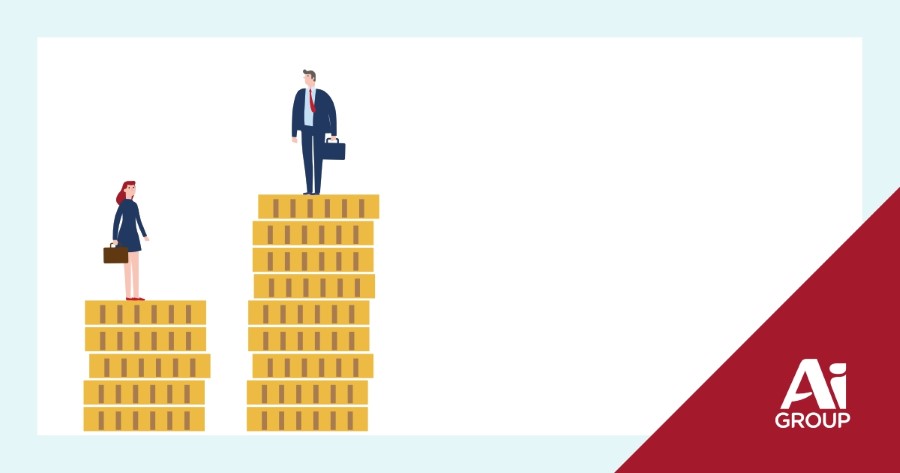
The main contributors to the gender pay gap were revealed last week, ahead of the Australian Government’s Jobs and Skills Summit in September.
The findings, in KPMG’s report, She’s Price(d)less: the economics of the gender pay gap, are timely, given women’s employment participation, equal opportunities and equal pay have been identified by the Australian Government as priorities of the upcoming Summit.
The report analyses the reasons for the national 2020 hourly gender pay gap of 6.5 per cent.
Since the 2017 report, the three significant reasons for the gap continue to be:
The report estimates that closing the gender pay gap across these three drivers is the equivalent of $898m in national earnings per week.
Government policies aimed at more affordable and accessible childcare, more equitable access to paid parental leave for men and women and support for employers to build inclusive workplaces would all help, the report said.
Nicola Street, Ai Group’s Director of Workplace Relations Policy – Diversity, Equity and Inclusion, said it was encouraging that these issues would be a focus of the upcoming Summit.
“Ai Group, as a peak industry body, supports these objectives and will constructively work with the Australian Government to achieve gains in inclusive workforce participation,” Ms Street said.
“Prior to the federal election, Ai Group proposed targeted workplace inclusion reform that we want to see adopted by the Australian Government to support the community and workplaces and to boost participation in the labour market.”
These include:
“What we need from a policy framework and for businesses to be mindful of is that to narrow the gender pay gap, we need to look at how unpaid domestic and caring responsibilities are more evenly shared," Ms Street said.
"This includes ensuring men and women have more equitable access to paid parental leave in both Government and enterprise-funded schemes. For example, for businesses who provide their own employer-funded paid parental leave, consideration should be given to gender-neutral paid parental leave arrangements.”
Victoria Halliday, Head of Ai Group Workplace Lawyers, agreed.
“Amending internal policies, particularly those related to parental leave and flexible working, are tangible ways that employers can influence in this space," she said.
"This is something that Ai Group Workplace Lawyers can readily assist with.”
For the first time, KPMG’s annual report explores the gender pay gap in five different industries. It found “female-dominated” industries such as health, social services and education and training had, in fact, much higher gender pay gaps than the national average — but lower representation of women in senior management.
The manufacturing industry, in contrast, had a much lower gender pay gap than the national average but also has a much lower representation of women in the industry generally.
The gender pay gap is widest in senior management levels, owing to factors such as inadvertent workplace discrimination, workplace interruptions and gender segregation along industry and occupational lines.
The pandemic has thrown a lot of challenges to the workplace advancement for women, although the entrenchment of flexible, hybrid and remote work is a win.
“The report shows that while the gender pay gap is pleasingly trending downwards over time, it has stalled,” Ms Street said,
“The report highlights that the pandemic has caused a lot of disruption, particularly with women opting out of the workforce, at least for a limited period, which over time, impacts earning potential in the future.
“The added home-schooling responsibility seemed to influence the decision of many parents, particularly women, to reduce or end work commitments in order to meet the unpaid demands of domestic household commitments while looking after their own mental health.
“However, on the upside, we are seeing many businesses embrace flexible work, including hybrid work or exclusively remote work, which allows more diverse participation of employees and more opportunities for people to be considered for promotion if they are not required to travel or commute for long hours.”
Ms Halliday shares this view.
“Enabling flexible working opportunities is a great way for employers to create a more inclusive workforce – and moreover, to narrow their gender pay gap by attracting more women to senior roles and signalling it is OK for men to work flexibly as well.”
Please contact Ai Group Workplace Lawyers on 1300 55 66 77 for advice and support around amending flexible work and parental leave policies, as well as other matters concerning gender equality in the workplace.
Ai Group’s Diversity & Inclusion Network meetings, facilitated by Nicola Street, promote the exchange of leading practice initiatives among members to support inclusive workplaces. Click here for more information.
Save the date for the next meeting on Thursday, August 11: “Improving Business Engagement with First Australians in Employment and Business Supply Chains.”

Wendy Larter is Communications Manager at the Australian Industry Group. She has more than 20 years’ experience as a reporter, features writer, contributor and sub-editor for newspapers and magazines including The Courier-Mail in Brisbane and Metro, the News of the World, The Times and Elle in the UK.